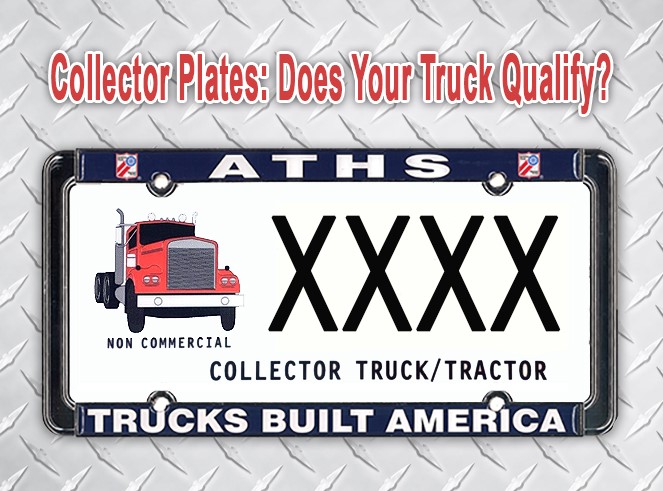Collector plates really complete a historic semi-truck, but getting them isn’t always as simple as it sounds. Most states allow historic registration for semi-trucks, but the rules vary, and some can be stricter than they are for classic cars. Here’s what you need to know:
Age Requirements – Most states require a truck to be at least 25 to 50 years old to qualify. For example, Texas allows antique registration for vehicles over 25 years old, while Minnesota requires at least 30 years for a “Pioneer” plate.
No Hauling Loads – If you’re planning to use the truck for work, historic plates aren’t an option. These trucks cannot be used commercially, and some states, such as Pennsylvania, specify that historic commercial vehicles can’t carry loads, even for personal use.
Restricted Driving – Most states limit driving to parades, exhibitions, club events, and occasional pleasure use. Some states define “occasional.” Texas restricts them to events and public interest activities, while in Virginia, vehicles with antique plates may be driven up to 250 miles from the owner's residence for personal reasons.
Different States, Different Plates – Some states issue antique truck-specific plates, while others categorize semis under broader historic vehicle registrations. Colorado offers Collector Truck/Tractor plates for trucks and tractors 32+ years old, separate from general collector plates. These vehicles may have mileage restrictions (e.g., 4,500 miles per year) and, if 1976 or newer, require emissions testing. Nevada’s Antique Truck plates are for 25+ year-old trucks over one ton, used only for exhibitions, shows, and parades.
Farm Trucks – A few states allow antique farm trucks to keep working in a limited capacity. Kansas permits historic plates on farm trucks used for non-commercial agricultural purposes, as long as they don’t exceed a certain weight.
Fire & Military Trucks – If your semi started life as a fire truck or military transport, your state might have special rules. Some states allow retired emergency vehicles to qualify for historic plates, even if they were originally commercial-use vehicles. Wisconsin provides "Historic Military" license plates for vehicles manufactured for use in any country’s military forces and maintained to accurately represent their military design and markings without alterations.
Parade & Special Event Permits – If your truck doesn’t qualify for full historic plates, some states offer temporary permits for parades, shows, or special events. Washington State, for example, allows unlicensed vehicles to operate on public highways for up to 3 consecutive days. Owners can obtain up to 3 permits per vehicle within a 30-day period.
"Occasional Use" Depends on the State – Some states are strict, others more lenient. Tennessee mandates that vehicles with antique plates are limited to use on weekends for general transportation. This means owners can drive their antique vehicles on public roads only on Saturdays and Sundays.
NOTE: Some states, such as California and Michigan, require vehicles with collector or antique plates to carry specialized insurance, like antique or agreed-value coverage, due to limited-use restrictions.
Rules and restrictions vary by state, so be sure to check with your local DMV or licensing office to get the exact requirements for your truck.
While you're at it, visit the ATHS Store to grab an official American Truck Historical Society license plate frame to go with it! tinyurl.com/athsplateframe
